|
|
|
Sort Order |
|
|
|
Items / Page
|
|
|
|
|
|
|
| Srl | Item |
| 1 |
ID:
128367
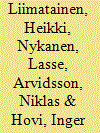

|
|
|
|
|
| Publication |
2014.
|
| Summary/Abstract |
In order to promote policy targets for decarbonising road freight, it is important to gain knowledge on the current energy efficiency practices of hauliers in various countries. This research aimed to provide such knowledge to enable international comparison of the energy efficiency practices of road freight hauliers. This was achieved by replicating the Finnish haulier survey in Denmark, Norway and Sweden. Energy efficiency index was developed to provide a simple metric for international comparison. The EEI covers various aspects of energy efficiency to provide a comprehensive outlook into the issue. The monitoring practices are fairly similar in all four countries, with typical monitoring done manually when filling the tank and data kept on a computer. Tonne-kilometre data is rarely monitored, but some other performance measures may be used. Current level of implementation of various energy efficiency actions is rather similar between the four countries. The simple and inexpensive actions, like choosing the lorry according to the cargo and idling avoidance, are most widely implemented. The energy efficiency index developed in this research proved to be a very useful tool for comparing the hauliers in the four countries.
|
|
|
|
|
|
|
|
|
|
|
|
|
|
|
|
| 2 |
ID:
082691
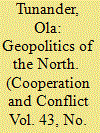

|
|
|
|
|
| Publication |
2008.
|
| Summary/Abstract |
After the Cold War, the Nordic states turned to the south, to the European Union. They established borderland regions to handle practicalities and relax the tension between east and west. Now, the Nordic states were free from Cold War bloc politics. The Nordic foreign policy elite amalgamated with Nordic constructivist scholars to reshape the political landscape of the North by re-inventing the pre-nation-state regional ties. However, the Nordic states also came to adapt to a new geometry of power, the Kjellénean power triangle. This return to Kjellénean geopolitics was not based on the power politics of the `US victory school', but, paradoxically enough, on European and Scandinavian relative weakness: a Geopolitik of the weak. Even more paradoxical, this return to geopolitics took place in Norway, Finland and to some extent in Denmark, not in Kjellén's home country of Sweden, i.e. as if the Swedish geopolitical taboo still made this impossible
|
|
|
|
|
|
|
|
|
|
|
|
|
|
|
|
| 3 |
ID:
130142
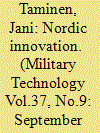

|
|
|
|
|
| Publication |
2014.
|
| Summary/Abstract |
Mönch has produced several special issues on individual Nordic countries over the past 30 years. This is the first time that Mönch or any professional defence publication has focused solely on the defence innovations from the Nordic Region.
|
|
|
|
|
|
|
|
|
|
|
|
|
|
|
|
| 4 |
ID:
065944
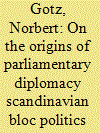

|
|
|
| 5 |
ID:
191009
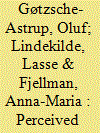

|
|
|
|
|
| Summary/Abstract |
Approaches to countering violent extremism (CVE) increasingly call upon ordinary citizens to report concerns regarding radicalization to authorities. However, knowledge about the factors determining their willingness to report remains limited. This paper addresses this void by asking under what circumstances members of the public are willing to report concerns of radicalization to authorities. The paper reports findings from a large-scale, comparative survey experiment fielded to nationally representative samples in Sweden, Denmark, Norway and Finland (n = 7,389) as well as eight city representative samples (two in each country, n = 6,603). We investigate how perceptions of the appropriateness, inclusiveness, implementation and outcome of CVE policies combine in forming perceptions of the legitimacy of CVE policy, and how manipulations of perceived legitimacy shape willingness to collaborate with authorities. Both cross-country and cross-city differences in willingness to report concerns of radicalization are explored. The results show that the more legitimate citizens perceive CVE policies to be, the more willing they are to contact authorities to report concerns of radicalization, while perceptions of CVE policies as illegitimate lead to a preference for reactions involving “intimates” of the individual in question and short of reporting to authorities. The implications of the findings for CVE practices are discussed.
|
|
|
|
|
|
|
|
|
|
|
|
|
|
|
|
| 6 |
ID:
163199
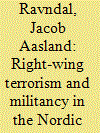

|
|
|
|
|
| Summary/Abstract |
Combining new quantitative and qualitative data, this article first describes and compares the evolution of right-wing terrorism and militancy in the Nordic countries between 1990 and 2015. Having established that Sweden has experienced considerably more right-wing terrorism and militancy than the other Nordic countries have, the article then seeks to account for Sweden’s outlier position. In doing so, the article draws on three concepts proposed by social movement research: organizational resources, political opportunities, and frame analysis. Applying these concepts to the Nordic countries, the study finds that Sweden’s outlier position may result from different WWII experiences, leaving Sweden with a stronger and more resilient extreme right movement, but also from receiving more immigrants while lacking influential anti-immigration (radical right) parties, and from conducting a more restrictive public debate on immigration, leaving little room for anti-immigration concerns in the public sphere. While the first two explanations are consistent with existing research, the third challenges the dominant view on how the public debate on immigration might influence extreme right mobilization and violence.
|
|
|
|
|
|
|
|
|
|
|
|
|
|
|
|
| 7 |
ID:
076797
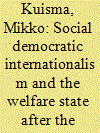

|
|
|
|
|
| Publication |
2007.
|
| Summary/Abstract |
The 'Nordic model' is often seen to exist in political economy, where, according to many commentators, the main components of the model have been the universal welfare state, centralized wage-bargaining structures and high level of taxation. However, the argument in this article is that the 'Nordic model' should be seen as a broader concept, ranging from social and economic policy to foreign and security policy. In addition, the central claim here is that the socio-political history of that model is crucially important in providing understanding of the linkages in ideational inspiration across these different policy sectors. The 'Nordic normative legacy' and the experience of nation- and state-building and construction of national identity were important in the construction of the welfare state. However, the 'Nordic model' was traditionally based on a form of 'welfare state nationalism' that is becoming increasingly difficult to sustain in the 'global age'. The main problem comes from confronting the challenges of multiculturalism. It is one of the central arguments here that the decline of Nordic internationalism and the 'crisis' of the welfare state are inherently linked. The 'Nordic model' is not well equipped to deal with the blurring of the boundaries between internal and external-domestic and foreign. However, as Nordicity and its social foundations are still largely intact, the task now is to rejuvenate the 'Nordic model' and move away from welfare state nationalism towards a more inclusive concept of welfare state internationalism.
|
|
|
|
|
|
|
|
|
|
|
|
|
|
|
|
| 8 |
ID:
170756
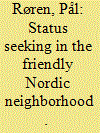

|
|
|
|
|
| Summary/Abstract |
The article argues that the way status is pursued in social groups in world politics is contingent on the type of social relations that constitute interaction between the members. The Nordic region is a group of countries marked by friendship and trust. Here, the numerous societal linkages between the Nordic countries have made their region into a ‘friendly neighborhood’. This has changed the way that these countries pursue status. To explore this status dynamic, the article draws on a series of interviews with Nordic diplomats and argues that a strong friendship both enables collective status seeking, and constrains individual status seeking. Specifically, turning their social group into a friendly neighborhood allows the Nordic countries to posture as a collective polity and seek status on behalf of it. This grants them more status recognition in world politics. Moreover, friendship does not eliminate status rivalry, but it does turn it into a friendly kind of status competition. Indeed, while the intra-regional intensity of the competition endures, the article finds that the Nordic countries are unlikely to compete in ways that might harm their friendship or their neighborhood.
|
|
|
|
|
|
|
|
|
|
|
|
|
|
|
|
| 9 |
ID:
104201
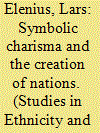

|
|
|
|
|
| Publication |
2010.
|
| Summary/Abstract |
The cultural charisma of the Sámi people has served to inscribe them in the nation myths of the Scandinavian states. This charisma was also built into the self-image of the Nordic countries when they established as a political organisation in the 1950s. While this charisma was to some extent created by leaders of the majority population, its symbolic value has also been used by the Sámi movement as a tool for political mobilisation. The global resistance by indigenous people towards colonialism resulted in a shift of the Sámi people's strategy from national to global action, and in the redefinition from a 'nature people' within the nation-state to an 'indigenous people' in a global legalistic discourse. At the same time, Sámi politicians strive to unite the different Sámi groups through a common homeland, Sápmi, which crosses the nation-state borders. The political territory of Sápmi can culturally be regarded as an imagined nation in the same way as a nation-state, even if it is scattered across four countries. The creation of a Sámi nation also faces the same kind of inter-ethnic problems as the nation-state.
|
|
|
|
|
|
|
|
|
|
|
|
|
|
|
|
| 10 |
ID:
163197
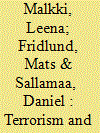

|
|
|
|
|
| Summary/Abstract |
The introductory article to the special issue discusses terrorism and political violence in the Nordic countries and reviews the state of academic research on the topic. Even though the Nordic countries appear to have suffered from lower levels of terrorism and political violence than many other Western states, they have been less void and peripheral with regard to such phenomena than common wisdom and academic scholarship would suggest. While some notable acts of violence like the July 2011 attacks in Norway have been covered in research literature to a certain degree, other phenomena such as far-right violence in Sweden have attracted less attention. The article discusses the ways in which the analysis of Nordic countries could contribute to the field of research and how articles included in the special issue address existing gaps in literature.
|
|
|
|
|
|
|
|
|
|
|
|
|
|
|
|
|
|
|
|
|